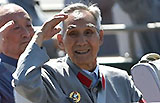From stuffy to selfies: Elizabeth II tries to change with the times
(Agencies) Updated: 2015-09-06 15:27SYMBOLIC
While the monarchy worked hard to repair its image, the British public was falling out of love with Blair and elected politicians. As disillusionment grew and lawmakers were embroiled in a scandal about their expenses, the queen's slowness to change morphed from being a weakness into a strength.
"Whatever the queen's personal rating it's better than the ... political leaders'," Professor Murphy said.
"When you get past trauma of Diana's death into the last 10, 15 years or so, in a way there's a new kind of creeping respect for the way she's stayed the same, always done her duty, still keeping the show on the road."
For those looking for modernity, the queen's photogenic and charismatic grandsons William and Harry look like princes at ease with ordinary Britons.
"The institution has redeemed itself successfully by an expensive but clever use of PR," said lawmaker Paul Flynn, one of the few self-professed republicans in parliament.
"They are symbolic, there is a great wave of popularity for the younger royals and clearly the institution is secure for the immediate future but it is very much thanks to the personality of the queen and her reluctance to get involved in matters that do not concern her."
Biographer Lacey said the queen's great skill in changing the monarchy was knowing when to make concessions.
"Even tragedies and mistakes like Diana have been turned to the advantage of the monarchy," he said.
"Monarchy is only ever as good as the people doing the job. None of the family did the job very well as recently as the 1990s. Look at the depths to which it sank and the price they had to pay in terms of paying tax, getting rid of the royal yacht, eating humble pie.
"But they did it."






